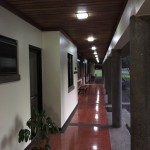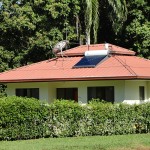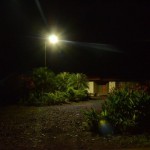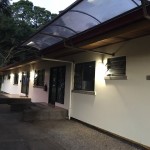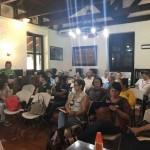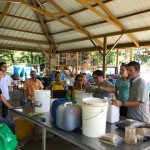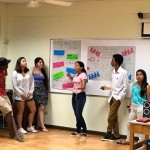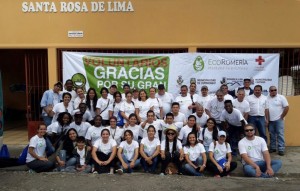The Environmental Action Unit (known as Unidad de Acción Ambiental in Spanish) is EARTH University’s office of environmental projections and protections. With more than 20 years in operation, the Unit provides multiple services to the campuses. Its main function is monitoring sustainability indicators – use of energy, water, solid waste, etc. – within the Institution, thereby allowing the University to set consumption reduction goals. Beyond the systematization of the information, the Unit promotes environmental education and resource conservation within the EARTH community – as featured in its Institutional Environmental Management Plan.
The Environmental Action Unit works within five pillars of sustainability: waste management, energy efficiency, water management, carbon neutrality and alternative energies. Their strategic implementation has won the University multiple ecological stewardship awards from the national Bandera Azul Ecológica Program.
Recent examples of infrastructure improvements spearheaded by the Unit include installing a new campus-wide drinking water filtration system, swapping old lighting fixtures for enhanced LED alternatives, outfitting bathrooms with solar-powered water heaters, equipping campus vehicles with photovoltaic panels and more.
Some indicators and results (2017)
SOLID WASTE MANAGEMENT:Waste separation efficiency in 2017 was 88 percent, visible in the following graphic.
Total campus waste recuperation in 2017 is presented in the following graphic:
The Energy Efficiency Management and Use Program monitors the campus’s waste in real time. It has 55 internals meters and more than 120 meters installed by the national energy provider. The investment in energy-efficiency technology, along with the monitoring, have led to a reduction in energy consumption habits within the campus, year over year, since 2007. In the following graphic, you will see the reduction in KWh within the campus’s central hub since the year 2007.
The University operates 51 solar-powered water heaters and 90 photovoltaic panels within the campus.
- Lámparas led en exteriores Edificios
- Calentadores Solares Sol Ray Tubos al vacío
- Lámparas led en jardines
- Lámparas led en exteriores Edificios
A reduction in GEI emissions and emission offsets maintain the campus’s C-neutrality.
WORKSHOPS
The Environmental Action Unit offers diverse environmental education trainings to students, staff, neighboring communities, organizations and visitors. All take place on campus.
- Capacitación en Liberia
- Comunidades 14 de Febrero
- PMIR Inducción Estudiantes

Bandera Azul Ecológica Program
The Programa Bandera Azul Ecológica (Ecological Blue Flag Program) is a Costa Rican governmental initiative recognizing organizations that meet strict benchmarks regarding water quality, environmental education, natural resources management and security. In 2016, thanks to its dedication and commitment to environmental protection and community health, EARTH received distinctions in six categories, including climate-neutral campus and protected natural spaces. The University has routinely received the latter distinction – the Program’s highest award – since its creation, by offsetting more than 73,277 tons of CO2.
EcoRomería:
EcoRomería is an initiative in which EARTH University and the Costa Rican Ministry of National Education teach participants of the annual Romería religious pilgrimage about proper waste classification and recycling.
EARTH began organizing EcoRomería in 2011. In 2014, the project was willed to the Costa Rican Red Cross to equip it with a greater presence and reach. EARTH’s Environmental Action Unit continues the University’s involvement in the initiative by enlisting the help of students, faculty and staff as volunteers.
Participation in REDIES
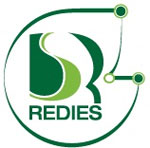
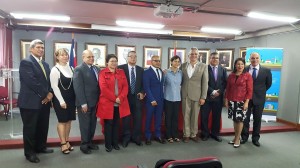 In 2009, EARTH convened an event called Perspectives on Sustainability in Costa Rican Organizations of Higher Education. The meeting set in motion the creation of the Costa Rican Network of Sustainable Educational Institutions (known as REDIES in Spanish), which today has 21 member organizations.
In 2009, EARTH convened an event called Perspectives on Sustainability in Costa Rican Organizations of Higher Education. The meeting set in motion the creation of the Costa Rican Network of Sustainable Educational Institutions (known as REDIES in Spanish), which today has 21 member organizations.
Under EARTH’s coordination since its creation, REDIES has helped to improve sustainability efforts on university campuses and determined such successes’ metrics and indicators. The Network has worked with university administrations to win their support for and commitment to sustainability initiatives. REDIES has sponsored forums on environmental management, carbon neutrality, waste management, water and sustainable purchasing, among others.
Since June 2012, REDIES has participated in the Ibero-American Network of Universities for Sustainability and the Environment (known as ARIUSA in Spanish) and the Latin American chapter of the Global Universities Partnership on Environment for Sustainability (GUPES). GUPES is a United Nations initiative aiming to promote the integration of environmental considerations in teaching, research, community involvement and university management, along with growing student participation in sustainable development activities on and off campuses.
REDIES presents an annual work report to the directors and presidents of participating institutions. In 2017, an event was planned to deliver the report in person.


